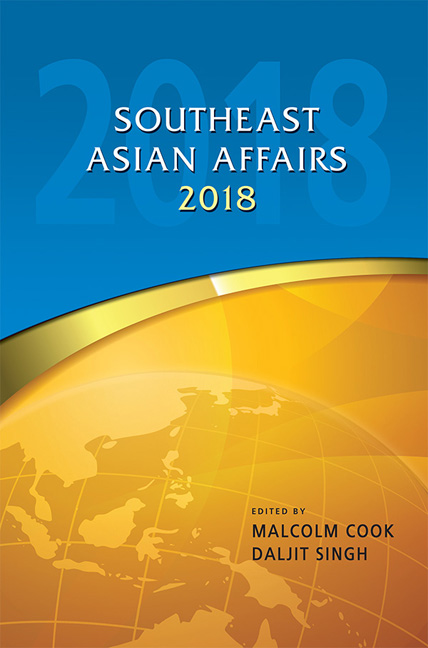Book contents
- Frontmatter
- Contents
- Introduction
- Acknowledgements
- THE REGION
- BRUNEI DARUSSALAM
- CAMBODIA
- INDONESIA
- LAOS
- MALAYSIA
- MYANMAR
- Stability and Expectations: Economic Reform and the NLD Government
- Myanmar in 2017: Crises of Ethnic Pluralism Set Transitions Back
- THE PHILIPPINES
- SINGAPORE
- THAILAND
- TIMOR-LESTE
- VIETNAM
Stability and Expectations: Economic Reform and the NLD Government
from MYANMAR
Published online by Cambridge University Press: 08 June 2019
- Frontmatter
- Contents
- Introduction
- Acknowledgements
- THE REGION
- BRUNEI DARUSSALAM
- CAMBODIA
- INDONESIA
- LAOS
- MALAYSIA
- MYANMAR
- Stability and Expectations: Economic Reform and the NLD Government
- Myanmar in 2017: Crises of Ethnic Pluralism Set Transitions Back
- THE PHILIPPINES
- SINGAPORE
- THAILAND
- TIMOR-LESTE
- VIETNAM
Summary
The people of Myanmar overwhelmingly voted in the 2015 general elections to usher in a historic change for the country. As a majority of the citizens hoped, the major opposition party, the National League for Democracy (NLD), won a majority of the vote. As a result, for the very first time, the people of Myanmar were able to witness a civilian government. The date of the election, 8 November 2015, marked a historic moment for Myanmar, and engendered great expectations among the public that reform would accelerate under the new administration.
Winning over 80 per cent of the vote, the NLD was able to form the government. The new administration, led by president U Htin Kyaw, commenced on 1 April 2016. The beginning of the journey for the new administration was quite rocky, as it had to boost an economy that had contracted in the difficult fiscal year (FY) 2015/16, affected as it was by natural disaster and lower commodity prices. As a first step in its economic reforms, in July 2017 the new government released a twelve-point economic policy agenda, covering all the important sectors. The twelve-point agenda, though generally positively received, was criticized for a lack of clarity, priorities or specifics.
The most significant economic reform of the year was the Myanmar Investment Law 2016. This was enacted in October 2016 and its implementation rules were published in March 2017. It replaces Foreign Investment Law 2012 and the Myanmar Citizens Investment Law 2013 with a consolidated law that provides a level playing field for both foreign and domestic investors. In addition, it will streamline internal procedures. However, there has been a delay in enacting another important piece of legislation for the country — the new Myanmar Companies Act, the most anticipated legislation for 2017. The act was approved by President U Htin Kyaw in the first week of December 2017. Hence, the NLD government failed to enact this important legislation during its first year as part of its economic reform agenda. This may have led to lower investments for the government's first year.
The first year of the NLD administration, FY 2016/17, witnessed a slower than expected growth rate of 5.9 per cent — lower than the average 7.3 per cent growth rate of the previous administration.
- Type
- Chapter
- Information
- Southeast Asian Affairs 2018 , pp. 221 - 242Publisher: ISEAS–Yusof Ishak InstitutePrint publication year: 2018

